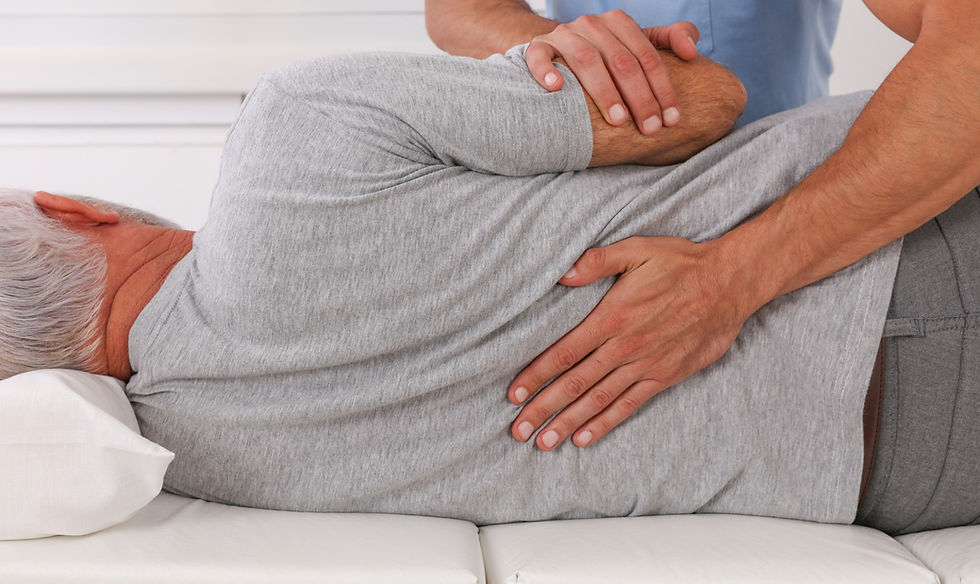Baby Backbends For Better Back Health
- Laurel Stuart Dr. Ac

- May 23, 2022
- 4 min read

Do you find yourself more often than not feeling achy in your lower back after practicing backbends? Or perhaps your back feels sore outside of your yoga practice, maybe after sitting or standing for extended periods?
Throughout time spinal health has been tied to wellness, youthfulness and longevity. Yoga backbends when performed correctly have the ability to improve both back flexibility and strength. We shouldn’t walk away from our yoga practice with an achy back. The backbends given in this article moderately extend the lower back in ways that encourage muscle awareness through the back, hips and pelvis. Regular practice of these postures may improve your ability to backbend with ease. These backbends are commonly taught in Forrest Yoga Classes as warming up backbends- for deeper poses such as wheel- or as therapeutic backbends- to ease discomfort in the lower back. Not all backbends may be good for your body. Double check with your general health care practitioner before practicing these postures if your suffer from back pain. As you practice these poses, feel for what creates a sense of space in your lower back. If there is any pain while practicing any of these postures don’t do them.
BRIDGE WITH A ROLL

Bridge with a roll between your inner thighs helps engage the muscles of your inner legs and pelvis. Start lying down. Place the roll (approximately 8 inches in diameter) between your inner thighs close to your groin. Inhale and lift your ribs towards your chin. On your exhale curl your tailbone towards the roll as you lift your hips then your back away from the floor. Press your feet into the mat. Keep your neck relaxed. On your inhales lift your ribs towards your chin. Use your buttock muscles on your exhales to tuck your tailbone, feel for creating length in your lower back by simultaneously lifting your ribs away from your pelvis while moving your sit bones towards your roll. Stay in the pose 3 to 10 breaths. There should be no pain in the lower back coming into, staying or getting out of the pose.
LOW COBRA

Low cobra gently tractions the spine while moving it into extension. Start on your belly. Ankles can be touching or up to hip width apart. Begin with your hands under your shoulders, then move them forward so your elbows are under or in front of your shoulders. On your exhale press the top of your thighs into the mat and strongly reach through your legs and feet. Keep your tailbone tucked as you drag your ribs forward and up on your next inhale. Keep your shoulders down, elbows approximately 1 inch away from your mat. Feel the muscles in your legs and pelvis working as you reach back through your legs. Hold Low cobra for 3 to 8 breaths. To release the pose drag your chest and ribs forward as you release your chest.
BOAT WITH A BLOCK (FINGERS ON YOUR SIT BONES)

Working boat (locust) pose with the fingertips on the sit bones helps encourage space in our lower back during back extension. Starting on your belly, place a block between your ankles and feet. Working with the block in between your ankles helps engage the muscles of the legs and pelvis. Work with the block turned at its narrowest, middle or largest width. See which block position feels better for your back. Place your fingertips on your sit bones. You want to feel these boney prominences under your hands. Inhale lift your chest and legs up off your mat. Exhale tuck your tailbone, reach through your legs and feel for pressing your sit bones into your fingertips. Hold from 3 to 8 breaths then release.
COBRA OVER A ROLL WITH A BLOCK

Cobra pose over a roll with a block massages the abdomen and helps maintain space in the vertebra, muscles and connective tissues of your lower back. Place a block between your ankles and feet. Use a roll approximately 8 inches in diameter. Place the roll under your belly. The roll is not touching your rib bones. Lay over the roll for a few breaths. Allow your abdomen to relax over the roll. Place your hands in front of your shoulders, in a similar position as in low cobra. Reach back through your legs and squeeze the block. On your inhale lift your ribs up and away from your pelvis. As you exhale allow your belly to relax into the roll. Hold from 3 to 5 breaths, then release.
STANDING BACKBEND WITH A ROLL BETWEEN THIGHS

Standing backbend with a roll between the thighs helps engage your leg and pelvic strength for safer back extension. Place the roll as close to the groin as you comfortably can. Place your hands on your lower back, your thumbs on either side of your sacrum. If that hand position is uncomfortable make fists with your hands and place them on your lower back. On an exhale, firm your abdominals and move your sit bones down towards your roll. As you inhale lift your bottom ribs, mid ribs then upper ribs away from your pelvis. As you exhale, pull your belly in, press through your feet and keep the lift in your chest. The lower back remains long while the legs are fully engaged. Hold the pose from 3 to 8 breaths using each inhale to create more space in your spine.
Namaste.





Comments